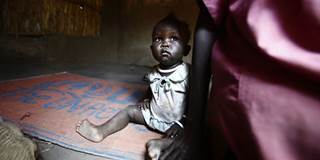The births of some 230 million children under the age of five – about one-third of the world’s total – have never been registered. And the consequences of being unable to prove one's age, identity, and nationality last a lifetime.
ABIDJAN – A name, an official identity, and a nationality recognized by everyone: most of us take these things for granted. Yet, for nearly a quarter-billion children around the world, including tens of millions in Sub-Saharan Africa, such basic rights are unattainable luxuries.
According to UNICEF, the births of some 230 million children under the age of five – about one-third of the world’s total – have never been registered. Asia is home to 59% of these unregistered children and Sub-Saharan Africa a further 37%. All of them grow up “invisible,” even to their own country.
The problem is particularly acute in certain African countries: only 3% of children in Somalia, 4% in Liberia, and 7% in Ethiopia have official papers, for example. Registration levels also vary widely within countries, both in Africa and elsewhere. Children born in rural areas, which are often far removed from administrative centers, are less likely to be registered than those living in cities. Income is another factor, with children born into the poorest 20% of households being far more prone to slip through bureaucratic cracks. Children of ethnic-minority or refugee families are even less likely to appear in a civil registry.

ABIDJAN – A name, an official identity, and a nationality recognized by everyone: most of us take these things for granted. Yet, for nearly a quarter-billion children around the world, including tens of millions in Sub-Saharan Africa, such basic rights are unattainable luxuries.
According to UNICEF, the births of some 230 million children under the age of five – about one-third of the world’s total – have never been registered. Asia is home to 59% of these unregistered children and Sub-Saharan Africa a further 37%. All of them grow up “invisible,” even to their own country.
The problem is particularly acute in certain African countries: only 3% of children in Somalia, 4% in Liberia, and 7% in Ethiopia have official papers, for example. Registration levels also vary widely within countries, both in Africa and elsewhere. Children born in rural areas, which are often far removed from administrative centers, are less likely to be registered than those living in cities. Income is another factor, with children born into the poorest 20% of households being far more prone to slip through bureaucratic cracks. Children of ethnic-minority or refugee families are even less likely to appear in a civil registry.